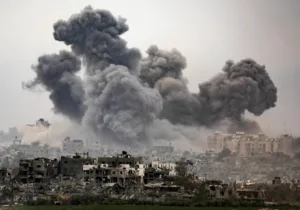Much has been written lately on both legacy and social media about the need for a ceasefire in order to facilitate humanitarian aid to the innocent civilians of Gaza. In almost all cases, the undercurrent to this commentary is that Israel must accede to the demands for a “humanitarian ceasefire” because not doing so would be both immoral and violate International Humanitarian Law (IHL).
Based on nearly universally accepted modern moral norms, IHL calls for protecting the innocent and vulnerable, and using the least amount of violence in self-defense (AKA proportionate response) as well as discriminating between combatants and non-combatants in times of war. If Israel were to pause its assault on Hamas’s military capabilities to allow humanitarian assistance to reach civilian non-combatants, it would only hinder the achievement of lasting strategic goals like restoring stability and ending the suffering that accompanies warfare as quickly as possible.
There is no argument against the right of the state of Israel to launch an armed response to the barbaric attack of 7 October. Every state has not only a right of self-defense but also the duty to protect its citizens. Given that Hamas has shown its dedication to the destruction of the state of Israel and the annihilation, or at least subjugation, of all Jews in the region, (“from the river to the sea”) Israel is obliged to eliminate Hamas as an organized entity that can threaten its citizens. Unlike a nation-state that subscribes to international conventions on humanitarian law and the laws of war, Hamas is a terrorist organization that has demonstrated it does not adhere to such conventions or laws. A pause or a ceasefire would only serve to delay the necessary elimination of Hamas and therefore prolong the suffering of both Gaza and Israel; such a ceasefire would thus be both immoral and contrary to the laws of war.
There is only one scenario in which a pause could be conceded by Israel without violating its moral obligation to end the war as quickly as possible: to allow for an honest third-party to oversee the unconditional release of the still living hostages taken by Hamas on October 7th. Who would be that honest broker? Only the ICRC comes to mind, for the UN and most nation-states have obliterated any pretense of impartiality. Whether by using “whataboutism” or “yes, but…” statements, the UN and many national governments are applying a warped interpretation of IHL and the laws of war to portray Israel as an oppressor, not the victim of unspeakable barbarity directed against its people.
Whether Hamas would deal honestly with the ICRC remains to be seen – the taking of civilian hostages is a war crime, as were the barbarous killings by Hamas on October 7th. Also, thus far Hamas has denied ICRC access to most hostages and has rejected calls from the ICRC to release the remaining hostages. It is hard to imagine, therefore, that Hamas would deal honestly with a neutral third party regarding the hostages, to include observing a temporary ceasefire or pause in the fighting to facilitate the release of hostages. More likely, it will continue to hold them as bargaining chips and human shields to delay the Israeli offensive. It is clear that any actions by Hamas presented as a response to humanitarian motivations (such as the release of two US-Israeli dual nationals) are simply propaganda tools to undermine Israel’s prosecution of the war.
Also, a pause or ceasefire to facilitate the delivery of humanitarian assistance is not needed in the southern half of Gaza. Israel is clearly attempting to avoid civilian casualties, only targeting known Hamas installations and concentrating on the northern one-third of the Gaza Strip. Unfortunately, some of those installations are co-located with civilian facilities such as hospitals. Locating military assets in a hospital is a war crime; targeting the military installation in a hospital is not. Also, given the success so far in the delivery of humanitarian aid via the Rafah border crossing with Egypt, clearly there does not exist a need for a ceasefire to deliver aid to a large part of the civilian population, especially if Hamas would draw down its stored fuel reserves for use of social services in Gaza.
In sum, demands for Israel to pause its offensive to facilitate humanitarian assistance to the innocents in Gaza would only have the effect of supporting Hamas. Much worse, it would delay the final resolution of the conflict and thereby be contrary to the laws of war and IHL by prolonging the suffering of civilians. Also, Israel has a moral obligation to protect its citizens by eliminating a proven and determined threat; agreeing to a ceasefire would therefore be an immoral act contrary to principles of Justice. The morally right thing to do is to bring the fighting to an end as quickly as possible by defeating Hamas – a ceasefire or pause would not serve that purpose and therefore should not happen.







 Sponsor a student for Christianity & National Security 2024
Sponsor a student for Christianity & National Security 2024